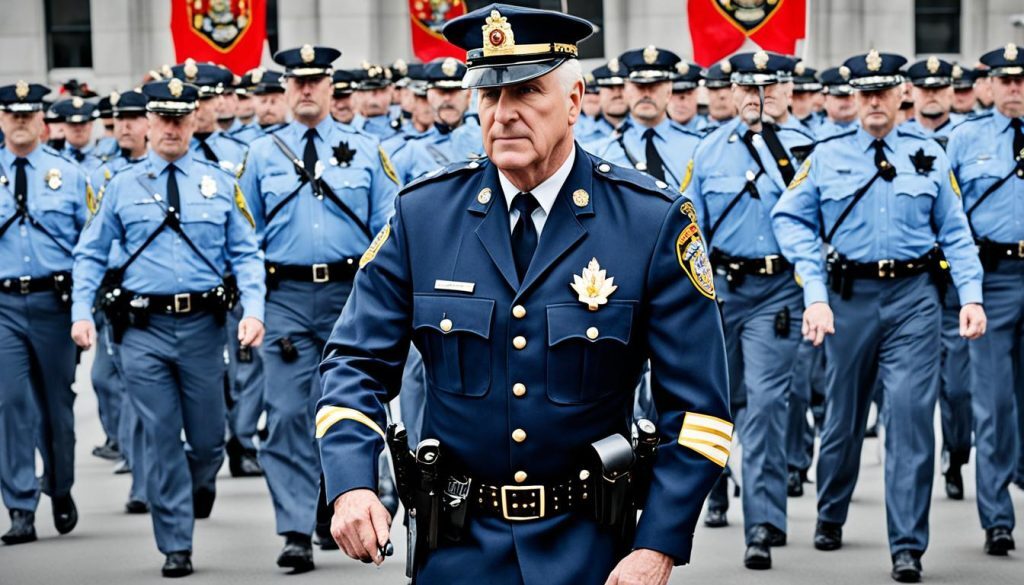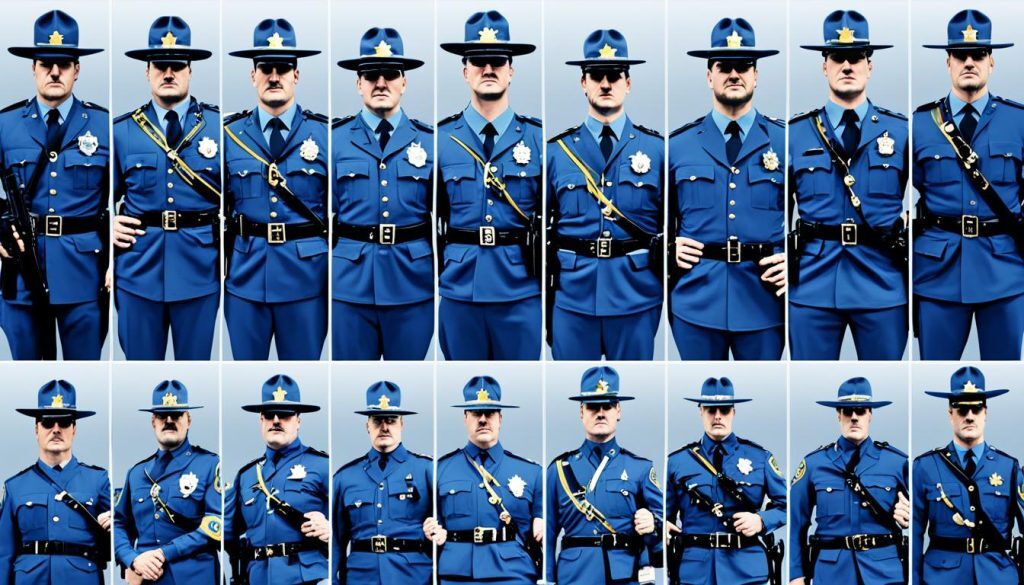The Royal Canadian Mounted Police (RCMP) is Canada’s national police service and has been serving the country for nearly 150 years. They are recognized worldwide for their policing excellence and iconic image as the “Mounties.”
The RCMP’s main responsibilities include preventing crime, enforcing the law, investigating offenses, ensuring the safety and security of Canadians, and providing assistance during emergency situations. The RCMP operates in over 700 detachments across 150 communities in Canada.
As of April 1, 2021, the RCMP had a total workforce of 30,558, which includes 19,000 police officers, 11,000 civilian members and public servants. The breakdown of the workforce by position is as follows:
- Commissioner: 1
- Deputy Commissioners: 6
- Assistant Commissioners: 26
- Chief Superintendents: 54
- Superintendents: 179
- Inspectors: 339
- Corps Sergeant Major: 1
- Sergeants Major: 10
- Staff Sergeants Major: 8
- Staff Sergeants: 830
- Sergeants: 1,993
- Corporals: 3,641
- Constables: 11,970
- Special Constables: 106
- Public Service employees: 8,307
- Civilian members: 3,087
Key Takeaways:
- The RCMP is Canada’s national police service and has been serving the country for nearly 150 years.
- They operate in over 700 detachments across 150 communities in Canada.
- As of April 2021, the RCMP had a total workforce of 30,558, including 19,000 police officers, 11,000 civilian members, and public servants.
- The RCMP’s main responsibilities include preventing crime, enforcing the law, and ensuring the safety and security of Canadians.
- The breakdown of the RCMP workforce includes various positions such as Commissioners, Deputy
Commissioners, Assistant Commissioners, Superintendents, Inspectors, Staff Sergeants, Sergeants,
Corporals, and Constables.
RCMP’s Role and Responsibilities in Canada
The Royal Canadian Mounted Police (RCMP) plays a vital role in maintaining law and order in Canada. As Canada’s national police service, the RCMP is entrusted with the responsibility to prevent crime, enforce the law, investigate offenses, and safeguard the safety and security of Canadians.
The RCMP carries out its duties at various levels, including community, provincial, territorial, and federal. With over 700 detachments in 150 communities across the country, the RCMP ensures that its policing services are widely accessible to Canadians. The RCMP is also dedicated to serving Indigenous communities, providing policing services in more than 600 Indigenous communities.
The RCMP operates within three main areas of responsibility:
- Contract and Indigenous Policing: The RCMP works under contracts with provinces, territories, and municipalities where there is no municipal police force. They ensure the provision of effective and responsive policing services to these areas. Additionally, the RCMP collaborates with Indigenous communities to deliver culturally sensitive policing services.
- Federal Policing: The RCMP is responsible for enforcing federal laws and statutes, which include drug trafficking, organized crime, border security, immigration enforcement, and cybercrime. They work closely with federal agencies and departments to combat crime at the national level.
- Specialized Policing Services: The RCMP provides specialized policing services, such as forensic identification, operational support, and tactical operations. They also offer professional training and expertise to police officers across Canada and internationally.
The RCMP’s commitment to maintaining law and order goes beyond Canadian borders. They actively participate in international policing activities, sharing intelligence with trusted partners, conducting specialized training, and supporting global efforts in combating transnational crime.

RCMP Manpower and Strength
The Royal Canadian Mounted Police (RCMP) relies on a dedicated workforce of over 30,000 individuals to fulfill their crucial role in ensuring the safety and security of Canadian communities. This workforce comprises police officers, civilian members, and public servants who work together to deliver high-quality policing services.
As of April 1, 2021, the RCMP had a total of 19,000 police officers, representing an essential component of their manpower. These officers hold various ranks within the RCMP hierarchy, ranging from Commissioner to Constable, each playing a vital role in maintaining law and order. The breakdown of police officers by rank is as follows:
- 1 Commissioner
- 6 Deputy Commissioners
- 26 Assistant Commissioners
- 54 Chief Superintendents
- 179 Superintendents
- 339 Inspectors
- 1 Corps Sergeant Major
- 10 Sergeants Major
- 8 Staff Sergeants Major
- 830 Staff Sergeants
- 1,993 Sergeants
- 3,641 Corporals
- 11,970 Constables
- 106 Special Constables
In addition to police officers, the RCMP workforce includes over 11,000 civilian members and public servants who provide invaluable support to their operations. These individuals contribute their expertise and skills in various positions and departments, ensuring the effective delivery of policing services across Canada.
The dedication and commitment of the RCMP workforce, comprising police officers, civilian members, and public servants, enable the RCMP to fulfill their mission of safeguarding Canadian communities and upholding the rule of law.

RCMP’s Role in Provincial Policing
In areas of Canada where there is no municipal police force, the RCMP provides provincial policing services under a 20-year contract. This means that the RCMP acts as the local law enforcement agency for these areas, ensuring the safety and security of the community. However, it is important to note that policing in Canada is considered to be a constitutional responsibility of provinces. While the RCMP serves as the provincial police service in most provinces and territories, Ontario and Quebec have their own provincial police forces. The RCMP works closely with provincial and municipal governments to provide policing services that meet the specific needs of each community and region.
RCMP Expansion in New Brunswick
The Royal Canadian Mounted Police (RCMP) is pleased to announce the expansion of its presence in New Brunswick. Over the next two years, 51 new front-line officer positions will be added to the province. This significant investment is made possible by the allocation of $32.6 million by the provincial government, with the aim of increasing the number of RCMP officers by 15%.
The distribution of these new officer positions will be based on several factors, including population, crime severity index, and officer to population ratio. The goal is to ensure more equitable and visible policing services across the province. Regional Service Commission 11, encompassing the greater Fredericton area, will experience the largest increase, with the addition of 15 new officers. This allocation will help improve the officer to population ratio in that region.
The RCMP is committed to the safety and security of the communities in New Brunswick. The expansion of officer positions will enhance their capabilities in carrying out proactive enforcement and providing better coverage to all areas. With this strategic investment, the RCMP aims to strengthen relationships with the community, improve response times, and maintain a high level of public safety throughout the province.